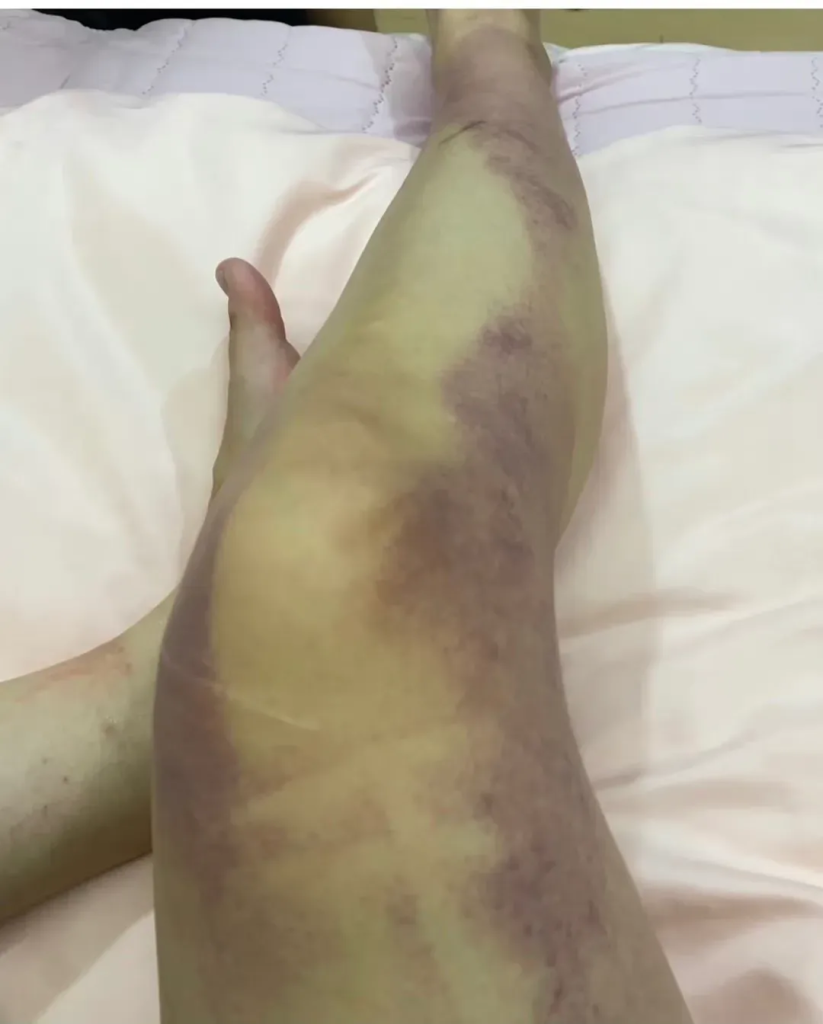
You’re getting dressed and you see it—a splotchy, purple-and-yellow mark on your thigh. You wrack your brain, but you can’t for the life of you remember bumping into anything. You dismiss it as a sign of being a little clumsier, a little less careful than you used to be. But when these mysterious bruises keep appearing, especially on the soft skin of your inner thighs or the tops of your legs, it’s easy to feel like your body is betraying you.
While a minor bump can certainly be the cause, a pattern of unexplained bruises, particularly in this area, is often more than just clumsiness. Those bruises on your thighs aren’t just random marks. They are very often a visible billboard that your blood is lacking the essential building blocks for strong, resilient capillaries.
Think of it this way: your body is a complex network of tiny, delicate pipes (capillaries) that carry blood right under the surface of your skin. These pipes are protected by a strong, flexible “scaffolding” made of collagen. For this scaffolding to be sturdy, it requires a constant supply of specific raw materials.
When you’re deficient in these key nutrients, the capillary walls become fragile, like old, worn-out garden hose. Even the slightest pressure—leaning against a kitchen counter, sitting with your legs crossed, or the normal jostle of a daily walk—can be enough to make them spring a tiny leak. The bruise is the evidence of that internal seepage.
The Essential Elements Your Blood May Be Missing:
- Vitamin C (The Master Cement): This is perhaps the most crucial player. Vitamin C is absolutely essential for producing collagen, the main structural protein that holds your blood vessels, skin, and connective tissues together. Without enough of it, the capillary walls become weak and porous, leading to easy bruising. It’s like the mortar between bricks starting to crumble.
- Vitamin K (The Emergency Responder): If Vitamin C builds the strong walls, Vitamin K is the 911 call that stops the leak. It’s vital for the clotting process, activating the proteins that form a plug over a break in a blood vessel. If you’re low on Vitamin K, a tiny rupture takes longer to seal, allowing more blood to escape into the surrounding tissue, creating a larger, more noticeable bruise.
- Bioflavonoids (The Protective Crew): These are the unsung heroes found in colorful fruits and vegetables, often alongside Vitamin C. Think of them as the reinforcing rebar in concrete. Bioflavonoids (like rutin and hesperidin) strengthen capillaries and reduce their fragility, making them less likely to break under minor stress.
Other Potential Messengers:
While nutrient deficiencies are a common cause, your body might also be sending other signals with these bruises. As we age, our skin naturally becomes thinner and loses some of its protective fatty layer, making the capillaries underneath more vulnerable. Certain medications, like blood thinners (aspirin, Plavix, Coumadin) or long-term steroid use, can also dramatically increase bruising.
What Your Body is Asking You to Do:
Seeing these bruises is a reason for curiosity, not panic. It’s a nudge to look at the quality of your nutritional foundation.
- Embrace the Rainbow: Make a conscious effort to eat a variety of colorful fruits and vegetables. Citrus fruits, berries, bell peppers, broccoli, and leafy greens are packed with Vitamin C and bioflavonoids.
- Go Green (The Leafy Kind): Dark, leafy greens like spinach, kale, and Swiss chard are excellent sources of Vitamin K.
- Talk to Your Doctor: This is the most important step. Mention the unexplained bruising at your next appointment. A simple blood test can check for deficiencies and rule out other potential causes. Never start a new supplement without your doctor’s guidance, especially Vitamin K if you are on blood-thinning medication.
Those unexplained bruises on your thighs are more than just unsightly marks. They are a clear, visual memo from your body, pointing directly to a potential gap in your nutritional armor. By listening to this message and nourishing your body with these essential building blocks, you can help fortify your inner scaffolding, leading to stronger blood vessels and clearer skin.